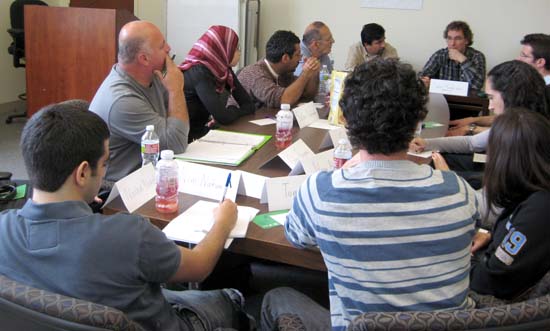Minds of Peace experiment ends mock assembly for Israeli-Palestinian treaty negotiation

The Middle East Coalition co-sponsored “Minds of Peace,” a mock negotiation between panels of Israeli and Palestinian student and community leaders.
By Areim Omar
May 18, 2010 10:28 p.m.
Monday night concluded the five-part Minds of Peace mock negotiation between a panel of five Palestinian and five Israeli delegates made up of UCLA students and community members.
The groups negotiated a symbolic peace treaty as part of an experiment sponsored by UCLA Hillel, Counseling and Psychological Services and the Middle East Peace Coalition. The land dispute as a result of the creation of Israel in 1948 is a sensitive subject for both parties and has contributed to the continuing instability and violence in the region.
“Obviously (the event is) not aimed at solving the Middle East conflict … but just to make people aware at the sensitivity of the conflict. It’s a great step in creating awareness for both the people watching and those engaging in (discussion),” said Sean Akaks, a fourth-year history student and president of the Middle East Peace Coalition.
The negotiations began Sunday with trust-building measures where each side brought up points they wanted to discuss and made compromises on each point.
The proposals’ wording was the main source of dissent among the delegates. Problems defining refugees and political prisoners and controversial debate over the name for the land pre-dating the creation of Israel led to a five-minute break for deliberations, but it only brought up further need for discussion. Specifically, the issue of Jerusalem remained unresolved, and the delegates agreed to cover the topic at a further date, Akaks said.
Personal anecdotes and statistics were brought up as rationale for the proposed amendments, making the issues more real and closer to both the delegates and the audience.
The event was mediated by Mazen Badra, a Palestinian professor from Sanford-Brown College and Webster University, and Sapir Handelman, an Israeli professor from University of Michigan ““ Saint Louis.
Tensions ran high during the dialogue but were swiftly dissipated when Badra interrupted with the question: “Can we trust each other and move forward or not?”
For the delegates to take part in the debate, they had to have lived in the region for some portion of their lives, which made it difficult to find Palestinian students qualified to participate.
There was skepticism from Palestinian representatives as well, with some questioning whether the dialogue would make any real progress, or whether actions such as a boycott, divestment or sanctions campaign, would be more effective, said Mahmood Bakkash, a second-year business economics student and the Palestinian delegate recruiter.
“It’s important to have a multi-faceted approach. A lot of people on campus have lost sight of the possibility of mutual understanding and reconciliation,” Bakkash said.
Although it was recognized that the event had no real standing in international law or politics, a public dialogue has never been more necessary, Akaks said.
“It’s the people that make the peace, not the politicians. In terms of the campus, it’s an important step in trying to mitigate the polarization of groups on campus,” he said.
The groups involved are hopeful of future events similar to the Minds of Peace Experiment and see it as a stepping stone for further dialogue between students and community members in developing awareness of the conflict, Akaks said.
“It was eye-opening and gave me a different opinion. The energy that was created last night should definitely be harnessed,” he said.


